Why did Poland die?
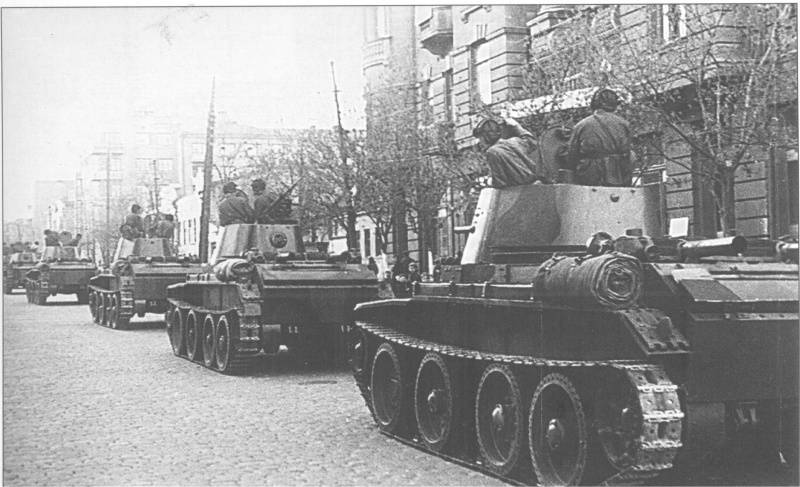
How the Polish elite sentenced the Second Polish-Lithuanian Commonwealth
In the prewar period, Warsaw looked upon Hitler Germany as an ally in a future war with the USSR (Polish predator) Poland participated in the Czechoslovak section. In the 1938 year, the Poles captured the Teszyn region, an economically developed region that seriously increased the production capacity of Poland’s heavy industry. In March 1939, when Germany finished Czechoslovakia, Slovakia became “independent” (vassal of the Third Reich), and Bohemia and Moravia (Czech Republic) became part of the German Empire. Warsaw did not protest against the seizure of the Czech Republic, but was offended by the fact that it was allocated a too small share.
Even before the capture of Czechoslovakia, Berlin began to exert pressure on Warsaw, preparing to resolve the Polish question. In January 1939, Hitler met with Polish Foreign Minister Beck. The Führer suggested that he abandon the old patterns and seek solutions on new paths. In particular, Danzig can be politically reunited with the German Empire, but Polish interests, especially economic ones (Danzig could not exist economically without Poland) should be ensured. According to Hitler’s formula, Danzig became politically Germanic, while economically he remained with Poland. The Führer also touched on the issue of the Polish corridor - after the Versailles Peace of 1919, the Polish territory divided East Prussia from the rest of Germany. Hitler noted that Poland needed a connection with the Baltic Sea, but Germany also needed a land connection with East Prussia. And it is necessary to find a solution that will meet the interests of both parties.
Thus, Adolf Hitler clearly articulated the interests of the Reich - to return Danzig to Germany and revise the status of the Polish corridor that separates Germany from East Prussia. Beck in response did not say anything sensible - neither for nor against.
In April 1939, England and Poland entered into a mutual assistance agreement. In the same period, Moscow invited London to conclude an agreement between Britain, France and the USSR on mutual assistance in the event of aggression in Europe against any of the contracting powers. Also, the three powers were to render any, including military, assistance to the Eastern European states located between the Baltic Sea and the Black Sea and bordering the USSR, in case of aggression against them. That is, with such an agreement, the Third Reich had no chance of winning against Poland or France. The West could have prevented a major war in Europe, but London and Paris needed a war - the “crusade” of Germany against Russia.
Such an agreement could change the course. stories, stop the further expansion of the Third Reich and World War II. However, most of the British and French elites preferred to continue the policy of bleeding Germany and Russia. Therefore, the summer negotiations of the USSR with the Western powers were in fact sabotaged by Paris and London. The British and French dragged on time, sent minor representatives who did not have broad powers to conclude a military alliance. Moscow, however, was ready for such an alliance; it proposed to place 120 divisions against the aggressor.
Poland generally refused to let the Red Army through its territory. Firstly, in Warsaw they were afraid of uprisings in the Western Russian regions, which, at the sight of the Red Army, would oppose the Poles. Secondly, the Polish elite has traditionally been overly self-confident. In Warsaw they were not afraid of a war with the Germans, they promised that "the Polish cavalry will take Berlin in a week!" If Germany dares to attack. In addition, the Poles believed that “the West will help them” if Hitler decided to attack Poland. Thus, the Polish elite refused the help of the USSR in a possible war with the Third Reich. Thus, Warsaw signed the death sentence to the Polish state.
Moreover, Warsaw itself provoked Berlin to attack. In the summer of 1939, a new phase of Polish pressure on Danzig began. 29 July Danzig protested against the rude behavior of Polish customs officers. On August 4, Warsaw presented an ultimatum to the free city, in which it promised to impose a blockade on food imports, if the Danzig government does not promise that in the future it will never interfere in the affairs of Polish customs. Also, Polish customs officers should have received weapon. In fact, Warsaw threatened to starve Danzig, as the free city depended on external food supplies. At the request of Hitler, the free city capitulated. Berlin feared that Warsaw wanted to provoke a conflict with Germany, but she had not yet completed military preparations and wanted to maintain peace.
Poland at that time was experiencing a military psychosis associated with the demand to return Danzig-Gdansk. In mid-August 1939, the Polish authorities began mass arrests of Germans in Upper Silesia. Thousands of arrested Germans were sent inland. Thousands of Germans tried to flee to Germany. German firms and organizations closed, consumer cooperatives and trade associations dissolved.
Back in February 1939, Warsaw began to develop a plan of war with Germany and was ready to expose 39 infantry divisions and 26 cavalry, border, mountain and motorized brigades. The Polish army numbered 840 thousand people.
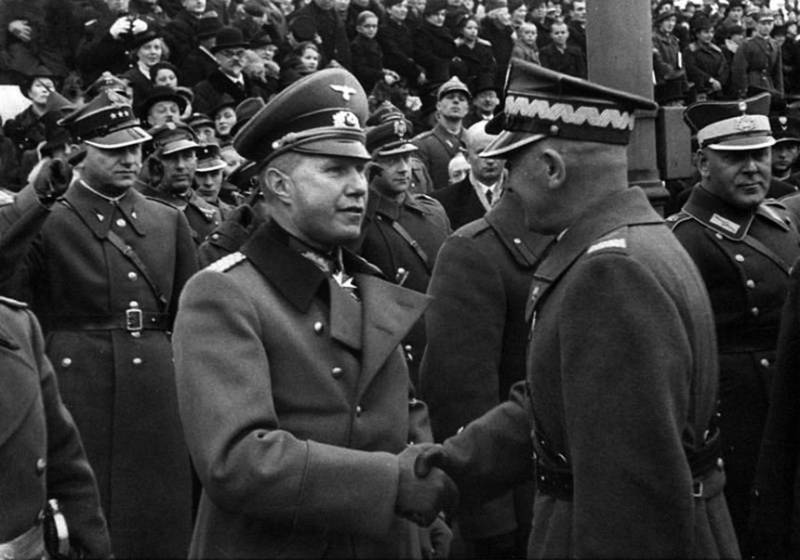
Disaster of the Second Polish-Lithuanian Commonwealth
Seeing that the Anglo-Franco-Soviet negotiations on the conclusion of a pact of mutual assistance had reached an impasse, despite all the efforts of Moscow, the Soviet government came to the final conclusion that the West wanted to overcome the crisis of capitalism at the expense of the USSR. In the Far East, in May 1939, fighting began on the Halkin-Gol River. Behind the Japanese stood the United States and England, which set the Japanese Empire on China and the USSR.
In the summer of 1939, Berlin held yet another secret negotiations with London. The British were plotting with Hitler at the expense of Soviet civilization. Not without reason a significant part of the British government documents about this period are still a secret. Negotiations with the Nazis were not only politicians, lords, but also members of the royal family. Moscow was aware of these negotiations and their contents. Stalin was well aware of secret German-British contacts. It was clear that the West wanted to come to an agreement at the expense of Russia.
It was necessary to make a reciprocal move, to gain time for the rearmament and modernization of the armed forces. In mid-August 1939, negotiations began between Moscow and Berlin. August 23 1939 Molotov and Ribbentrop in Moscow signed the "Non-aggression pact between Germany and the USSR." Also, two great powers distinguished spheres of influence in Eastern Europe.
Obviously, Stalin, like Western military analysts at that time, thought that the war in the West, following the example of the First World War, would have a long, positional character. The French trumpeted the whole world about the “inaccessibility” of the Maginot line. Nobody would have known and would not have believed in a blitzkrieg when the Wehrmacht defeated the Poles in two or three weeks, who were considered a serious military power and themselves threatened to take Berlin. The fact that the Germans in a few weeks will end with France, Belgium and Holland, and even the expeditionary British army. In the West, they did not think about defeat, and when the war between the USSR and Finland began, in Paris and London they began to prepare for war with Russia! Who could have foreseen that the armies of Poland, France, England, Holland, Belgium, Norway, Greece, Yugoslavia would be completely defeated, flee, and leave the Germans all their arsenals. That factories throughout Europe, including the “neutral” Swedes and Swiss, will work for the Third Reich.
In Moscow, they thought they were getting several years of peace. While Hitler will deal with Poland, France and England, the USSR will complete its programs for the rearmament of the Red Army, the creation of the ocean fleet. At the same time, having signed an agreement with Berlin, Molotov with one stroke of a pen ended the war in the Far East. In Tokyo, this non-aggression pact made a stunning impression. In Japan, it was decided that Germany had so far postponed plans for a war with the USSR. The fighting on Halkin-Gol ends, Tokyo makes a strategic decision on the offensive in the south (colonies and possessions of the Western powers).
1 of September 1939 of the year Germany attacked Poland. On September 3, England and France declared war on the Reich, but in reality did not fight. The "strange war" (Why England and France betrayed Poland), when the Anglo-French troops fraternized with the Germans, drank and played, “bombed” Germany with leaflets. Paris and London “merged” Poland, deciding that after its defeat Hitler would finally start a war with Russia. France and England had every opportunity to stop the great war in Europe at the very beginning. It was enough to start bombing the industrial centers and cities of Germany, to move their significantly superior forces against the weak second-rate divisions of the Germans on the Western Front (they did not even have tanks and planes!) To bring Berlin to its knees and make him ask for peace. Or play on fear of the German generals, bruised by the memories of the First World War, who was very afraid of a war on two fronts and was ready to overthrow the Führer. German generals did not know what Hitler knew - London and Paris would not wage a real war. They will give him Poland, as they gave Czechoslovakia, and how they will give France and almost all of Europe.
As a result, the Allies did not lift a finger to help a dying Poland. The Polish armed forces were actually not as strong as the Polish propaganda trumpeted. The Poles were more prepared for war with the Russians than with the Germans. The Polish military-political leadership overslept the qualitative strengthening of the German army. And the West, in which they believed so, did not help, betrayed. Already 5 September 1939 g. Followed the order of the Polish high command to withdraw the remaining troops to Warsaw, 6 September Polish front collapsed. The Polish leadership, before the war so proud and brave, turned out to be rotten. Already on 1 September, the president of the country Moscitsky fled from Warsaw, on 4 on September the evacuation of government agencies began, on 5 on September the government fled, and on the night of 7 on September the Polish commander-in-chief Rydz Smigly also fled from the capital. On 8 of September the Germans were already on the outskirts of Warsaw.
On September 12 the Germans visited Lviv, on September 14 they completed the encirclement of Warsaw (the city capitulated on September 28). The remaining Polish troops were dissected, isolated from each other. Basically, the Polish resistance from this time continued only in the Warsaw-Modlin region and to the west - around Kutno and Lodz. The Polish command gave the order to defend Warsaw at all costs. The Polish command hoped to stay in the areas of Warsaw and Modlin, and near the border with Romania, and wait for help from France and England. The Polish leadership at this time asked the French for asylum in France. The Polish government fled to the Romanian border and began to ask for transit to France. On 17 of September, the Polish government fled to Romania.
Thus, the Polish state by 16 — 17 September actually ceased to exist. The Polish armed forces were defeated, the Wehrmacht captured all the main vital centers of Poland, only a few large centers of resistance remained. The Polish government fled, not wanting to die heroically during the defense of Warsaw. With further movement, Germany would easily occupy the remaining regions of Poland. In Paris and London, this was well understood (that Poland was no longer), therefore they did not declare war on the USSR when the Red Army crossed the Polish border.
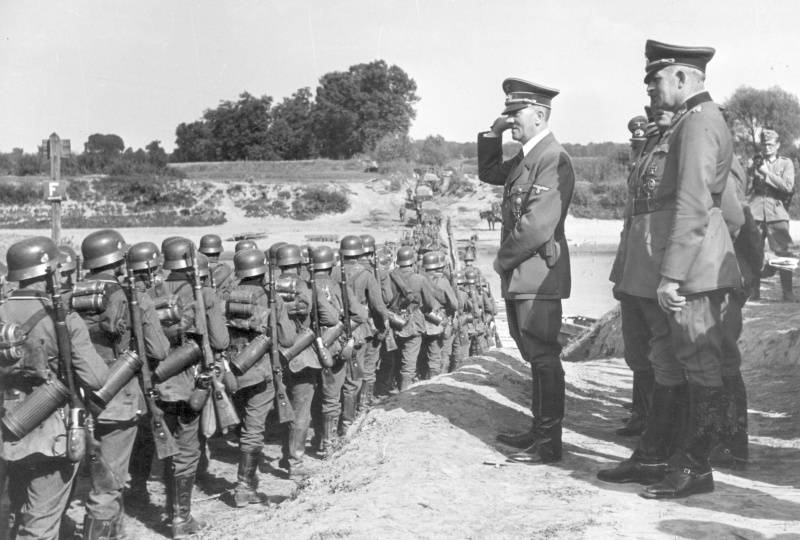
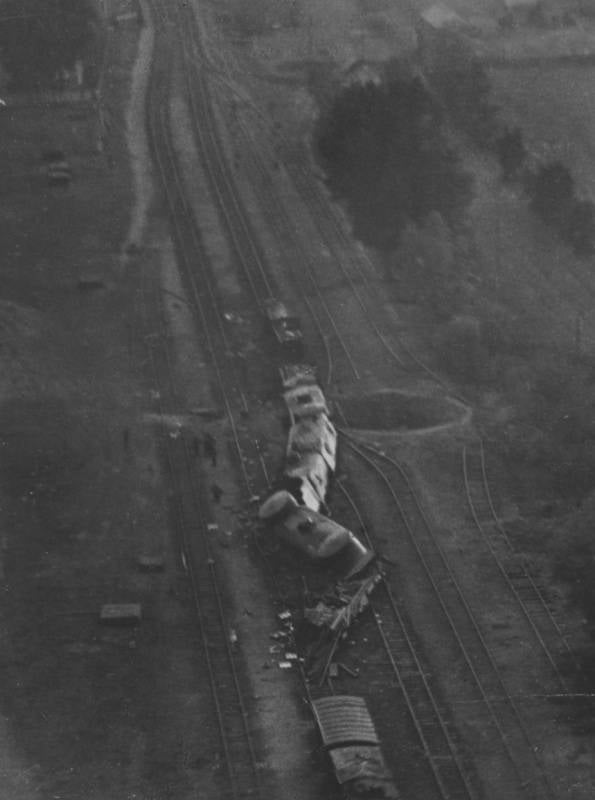
Polish campaign of the Red Army
Moscow faced the question: what to do in this situation? It was possible to start a war with Germany, violating the just-concluded non-aggression pact; nothing to do; occupy the West Russian regions occupied by the Poles after the death of the Russian Empire. To fight Germany and Japan, with the hostile attitude of England and France, was suicide. This scenario would clearly please the French and British, who wanted a clash between Germany and the USSR. It was impossible to do nothing - German troops would occupy all of Poland and save a few weeks in the 1941 year, which allowed them to implement the blitzkrieg plan and take Moscow in August - September 1941.
It is clear that the Soviet leadership made the most reasonable decision. On the night of September 17, Moscow informed Berlin that in the morning the Red Army would cross the Polish border. Berlin requested that the German aviation did not act east of the Bialystok - Brest - Lviv line. At 3 o’clock. 15 minutes. On the morning of September 17, the Polish ambassador in Moscow, Grzhibovsky, was handed a note stating:
As a result, the agreements between Poland and the USSR lose their significance. Poland may become a convenient bridgehead from which a threat to the USSR may arise. Therefore, the Soviet government can no longer observe neutrality, and Moscow can no longer indifferently look at the fate of the West Russian population (half-Ukrainians and Belarusians). The Red Army was ordered to cross the border and take control of the population of Western Belarus and Western Ukraine.
It is worth noting that in Paris and London they understood everything perfectly. On September 18, the British government decided that, according to an agreement with Warsaw, England is obliged to defend Poland only in the event of German aggression, so Moscow should not send a protest. The governments of England and France recommended that the Polish leadership did not declare war on the USSR. In Poland, the reaction to the Soviet note and the appearance of the Red Army on Polish territory was controversial. So, the Commander-in-Chief of the Polish Army Rydz-Smigly issued two conflicting orders: in the first he ordered to resist, in the second, on the contrary, he did not enter into battle with the Russians. True, the benefits of his orders were few, the management of the remaining troops was long lost. Part of the Polish command generally regarded the Soviet troops as "allied."
In general, the Polish army in the east of the country did not show serious resistance to the Red Army. So on the first day of the Polish campaign, the loss of Soviet troops amounted to 3 people killed and 24 wounded, another 12 people drowned. Already on 17 of September Baranavichy was occupied, in the area of which about 5 thousand Polish soldiers were captured. On the same day, our troops liberated Rivne. Dubno, Rogaczów and Lutsk occupied September 18 on September, Vladimir-Volynsky took September 19. 18 - On 19 of September, Soviet troops captured Vilna. In battles for the city, the 11 Army lost 13 people killed and 24 wounded, 5 tanks and 4 armored vehicles were shot down. About 10 thousand people and large reserves were captured in the Vilna region. On 19 of September, Soviet troops took the city of Lida and Volkovysk. On 20 of September, battles for Grodno began; on 22 of September, Soviet troops occupied the city. Here the Poles put up noticeable resistance. The Red Army lost 57 people killed, 159 wounded, 19 tanks were destroyed. 664 Poles were buried on the battlefield, more than 1,5 thousand people were captured. On 21 of September the Red Army occupied Kovel.
12 — On 18 on September, the German army surrounded Lviv from the north, west, and south. From the east to the city came out of the Red Army. The parties demanded from each other to withdraw troops from the city and not interfere with its assault. By the evening of 20 September, the Wehrmacht received the order of the high command to withdraw from Lviv. As a result, the Red Army took the city of 22 on September.
On 21 of September 1939, the troops of the Belarusian and Ukrainian fronts received an order from the people's commissar of defense to stop on the line reached by the advanced units. Meanwhile, the leadership of the USSR and Germany conducted intense negotiations over the demarcation line. On September 22, units of the German army began to retreat, gradually yielding to occupied territories that were within the sphere of influence of the USSR and the Red Army. In particular, on 22 of September, Soviet troops occupied Bialystok and Brest. By 29 September, the campaign was completed.
Thus, the Polish army did not show serious resistance. The Polish units immediately surrendered, or after a small battle, or retreated, abandoning fortifications, heavy weapons and supplies. During the Polish campaign from September 17 to October 2, October 1939, the Red Army lost 852 people killed and dead, missing 144 people. For comparison, in the conflict with Japan on the river. Khalkin-Gol, our loss of life amounted to over 6,8 thousand people and more than 1,1 thousand people missing. The Polish losses were, of course, higher - about 3,5 thousand killed, about 20 thousand wounded, about 450 thousand prisoners.
28 September 1939 in Moscow Ribbentrop and Molotov signed an agreement on friendship and border between the USSR and Germany. As a result, Russia returned the lands of Western Belarus and Western Ukraine-Little Russia: an area of 196 thousand square meters. km and with a population of about 13 million people. In November, these territories, according to the organization of the will of the people organized with the participation of the Soviet side, were annexed to the Ukrainian SSR and BSSR. The territory of the Vilnius region along with Vilnius was transferred to Lithuania in October. This event was of great military strategic importance - the borders of the USSR were moved to the west, which led to a gain in time.
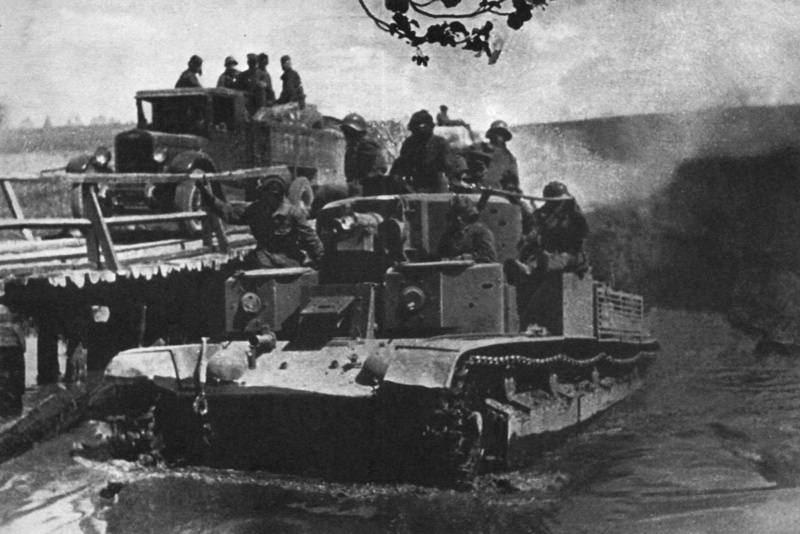
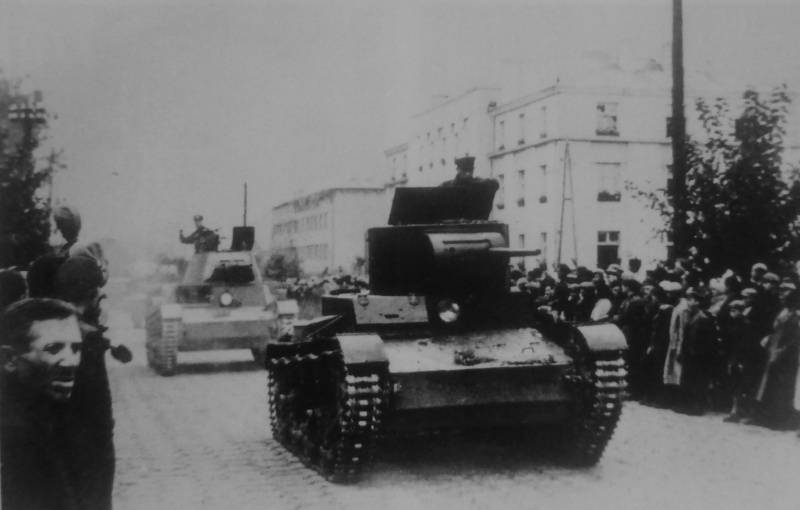
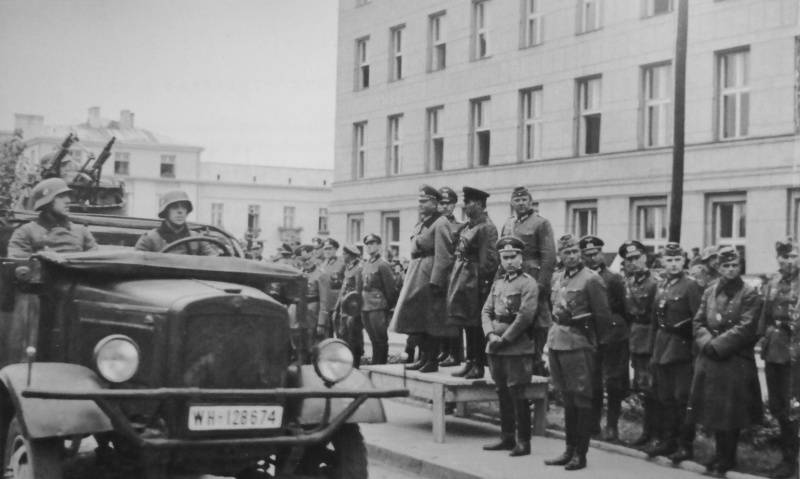
Information